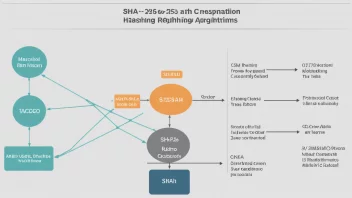Cryptographic hashing algorithms are essential tools in the realm of digital security, providing a mechanism to secure data, verify integrity, and enhance privacy. These algorithms take an input (or 'message') and produce a fixed-size string of bytes that appears random. Even the slightest change in the input will produce a completely different hash, making them invaluable in various applications such as blockchain technology, data integrity verification, and password storage. In this article, we will explore the fundamental aspects of cryptographic hashing algorithms and their practical applications.
1. What is a Cryptographic Hash Function?
A cryptographic hash function is a mathematical algorithm that transforms any input data into a fixed-size string of characters, which is typically a sequence of numbers and letters. The output, known as the hash value or digest, is designed to be unique for different inputs. Key properties of cryptographic hash functions include:
- Deterministic: The same input will always produce the same hash.
- Fast Computation: It should be quick to compute the hash value for any given input.
- Pre-image Resistance: It should be infeasible to reverse-engineer the original input from its hash value.
- Small Changes Impact the Hash: Even a minor alteration in the input should produce a drastically different hash.
- Collision Resistance: It should be difficult to find two different inputs that produce the same hash output.
2. Applications in Blockchain Technology
Blockchain technology relies heavily on cryptographic hashing to ensure the security and integrity of data. Each block in a blockchain contains a hash of the previous block, creating a chain that is nearly impossible to alter without detection. Key applications include:
- Data Integrity: Hashing ensures that the data within each block remains unchanged. Any modification would result in a different hash, alerting users to potential tampering.
- Mining Process: Miners compete to solve complex mathematical problems that involve finding a hash that meets specific criteria, securing the network.
- Smart Contracts: Hashes are used to verify the execution of smart contracts on platforms like Ethereum, ensuring that contract conditions are met.
3. Ensuring Data Integrity
Data integrity is a critical concern for both individuals and organizations. Cryptographic hashes are employed to verify that data has not been altered during storage or transmission. This is particularly important in sectors that handle sensitive information, such as finance and healthcare. Here’s how hashing ensures data integrity:
- File Verification: Hash values can be generated for files and compared with the original after transmission. If the hashes match, the data is intact.
- Digital Signatures: Hash functions are used in conjunction with public key cryptography to create digital signatures, which verify the authenticity and integrity of messages.
4. Password Storage and Security
Storing passwords securely is paramount in preventing unauthorized access to user accounts. Traditional methods of storing passwords in plain text are vulnerable to breaches. Instead, stored passwords should be hashed, often with added salt, to enhance security:
- Salting: A random string (salt) is added to the password before hashing, ensuring that identical passwords produce different hashes.
- Hashing Algorithms: Algorithms like bcrypt, Argon2, and PBKDF2 are specifically designed for password hashing, incorporating mechanisms to slow down brute-force attacks.
5. Real-World Case Studies
Several high-profile cases highlight the importance of cryptographic hashing in real-world scenarios:
- Target Data Breach: During the 2013 Target data breach, attackers exploited weak password hashing practices, leading to the exposure of millions of customer records.
- Bitcoin: The use of SHA-256 hashing in Bitcoin’s blockchain has played a crucial role in maintaining its security and integrity over the years, showcasing the effectiveness of cryptographic hashing in a decentralized network.
In conclusion, cryptographic hashing algorithms are foundational to modern digital security, impacting everything from blockchain technology to password storage and data integrity verification. Understanding their function and application is crucial for anyone involved in technology, cybersecurity, or data management.






